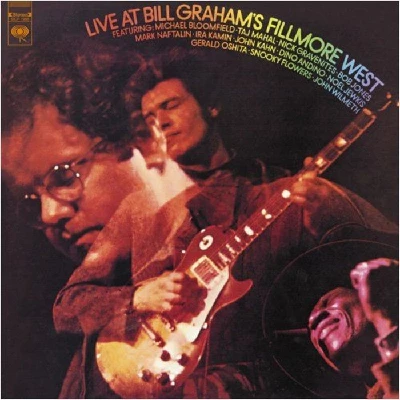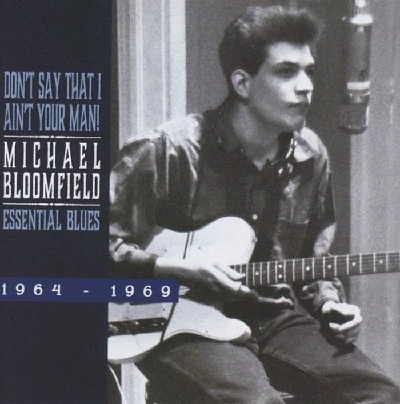published: 31 /
10 /
2017

Mike Bloomfield was once known as a Chicago blues icon, playing with The Butterfield Blues Band, The Electric Flag, and as a soloist. Lisa Torem listens to two newly-released albums of his stunning work.
Article
During the mid-1960s, electric guitarist Mike Bloomfield found fame via his passionate arrangements of blues classics and outstanding originals. His early years were spent sitting in with the likes of Muddy Waters and other talented black blues artists who found fame in Bloomfield's native Chicago.
His recognition includes being selected as one of Rolling Stone magazine's list of "100 Greatest Guitarists of All Time" in 2003 and his 2012 induction into the Blues Hall of Fame both as a solo artist and with the Paul Butterfield Blues Band.
His performances were with The Paul Butterfield Blues Band, Bob Dylan, the Electric Flag, Al Cooper, Nick Gravenites, whilst his solo work (1968-1980) included studio recordings with Memphis Slim, James Cotton, Janis Joplin. He also scored Medium Cool, which features scenes from the 1968 Democratic National Convention. In addition, he co-produced 'Mourning in the Morning' by vocalist and songwriter Otis Rush and in the 1970s he collaborated with JJ Cale for the film 'Canned Heat'.
His last performance was at San Francisco State College in 1981, just a week before he died aged only 37.
LIVE AT BILL GRAHAM'S FILLMORE WEST
Mike Bloomfield affectionately hugs a Gibson Les Paul on the cover of this evocative rendering. His legacy is that of a man who adored the blues who died way-too-young from an overdose, but his love for the music and all it entails is finally getting the attention it deserves.
'Live at Bill Graham's Fillmore West' was recorded over two weekends at the Bill Graham-feted concert series held in San Francisco. The young guitarist originally ventured out of the Chicago-area suburbs, fascinated by the wealth of black blues musicians, performing on the city's west side. He sat in and soaked up these new sounds over countless sessions, eventually linking up with Paul Butterfield, where they launched a contemporary and exhilarating sound.
On the first song, Nick Gravenites howls in pain on the fast-paced, Otis Rush-penned, 'It Takes Time' as Bloomfield charges ahead on guitar, no holds barred. On 'Oh, Mama', Bloomfield takes the helm on the vocals. The song has a very pleasing Dixieland tinge, as he ruminates, "You cause my ruin". Mark Naftalin's keyboard skills abound.
A. Conley's 'Love Got Me' features a scorching vocal duet between Bloomfield and Gravenites. The lyrics, "I can't even eat / I can't even sleep", "it hit me like a ton of bricks" get right to the visceral point.
'Blues on a Westside' is a 15:35 heart-wrench, sung soberly by Gravenites. Naftalin's keys are never far behind Gravenite's gritty vocals. "She'll look out her two windows and she'll see two different men" give an intense visual feel to the punchy background. Bloomfield soars and punctuates and it's hard not to pulsate along with every nuance. Noel Jewkis adds some brilliant, tenor sax.
'One More Mile to Go' features Taj Mahal and, again, this is an album which allows a song to really settle in: this one runs 11:08. This James Cotton tune is the perfect platform for Mahal's seasoned pipes. We also get to hear John Kahn's bass, which crawls slyly under the earnest melody. Mahal's earthy blues harp solo shakes and shimmers and moves this story along with grace.
"It's been a hard day's journey and I don't have to cry no more…" – those are some powerful words packed so cleverly into just one sentence…
'It's About Time' features once more the skillful Gravenites. This song breaks all boundaries. It's a swirling hybrid of beat jazz, soul and blues and although it seems to draw from a variety of past influences, this 1969 recording also careens into an ideological future. Curiously, the audience politely claps, perhaps still in a daze, perhaps still taking in the composition's incredible newness.
'Carmelita Skiffle' is a 5:18 instrumental featuring Bloomfield at his finest hour, but also inclusive of a great ensemble. Ira Kamin's fiery organ scorches and brass by; Gerald Oshita, Snooky Flowers and John Wilmeth.
DON'T SAY THAT I AIN'T YOUR MAN, ESSENTIAL BLUES
'Essential Blues' is a fifteen-track set, which includes John Hammond--produced work, songs recorded between 1964-1969 and a variety of styles and moods.
This album begins with 'I've Got you in the Palm of my Hands'. "I'm the seventh son of a seventh son", Bloomfield wails. He's carried away with confidence, more than ready to stake his claim. The song is full of driving starts and stops as well as some minor threats: "Don't say I ain't your man…"
On 'Last Night' he sings "Last night, I lost the best friend I ever had." This sad story, which rises above a trembling blues harp, is simply done, but mighty powerful.
'Feel So Good' draws from good old rock 'n' roll and is enhanced by some wicked percussion. Bloomfield's solo reveals shades of Chet Atkins.
'Goin' Down Slow' - "I've had my fun," the bluesman proclaims. There's only a little time to sit back and enjoy the optimism, as trouble lurks around the corner: on 'I Got my Mojo Working', Bloomfield's gruff- voiced delivery and superb turnarounds give this standard all the respect it deserves.
'Born in Chicago' - although many consider Chicago the home of the blues, there are really very few great blues-based songs that honor the city besides Robert Johnson's 'Sweet Home Chicago.' Nick Gravenites has written one of the finest and most palpable. Bloomfield, with The Butterfield Blues Band, pulls out all the stops. The result is a ballad that flows sweet and heavy on the bass, with great interaction between the players: badass drumming and fierce vocals.
'Work Song' is a widely-covered tune, which always poses a challenge for a band: here the Butterfield Blues Band. It swirls through a wild wash of blues-jazz. You can almost hear Bloomfield's brain explode as he ventures away from the standard blue patterns, creating an entirely new sound. He doesn't always hit the right note, but that's part of the charm—he's in there fighting and we get it. When the drums and organ duel, the excitement also excels.
C. Burnett's song 'Killing Floor' is another great one on which to improvise and tap into strong emotion. This one is from Bloomfield's days with The Electric Flag.
'Albert's Shuffle' is from Mike Bloomfield and Al Kooper's iconic 'Super Session' recorded in 1968. It imbues more of a "Booker T." feel than the rest of the tracks. The organ creates a fantastic fever and leads into some slick horn fills initially, and a bit later on, the brass and organ trade more than a few scrumptious licks,
'Stop' also hails from 'Super Session'. This Al Kooper-produced tune is super-charged with great fortitude and never-ending movement.
'Mary Ann', written and recorded by the late Ray Charles, had a finger-snapping familiarity. but this live version rises from a totally different sphere. At the onset, the vocals sound like they are coming from a wind-tunnel, and the players delight in the art of manipulating tempo and dynamic. Soon the song decidedly crosses over to a blistering blues, and back to that ethereal, desperate vocal. Blink and they're back to the hook. A great mental workout.
This great Albert King original, 'Don't Throw Your Love on me so Strong' was recorded in the fall of 1968. This is another cool collaboration between Kooper and Bloomfield '(The Live Adventures of Mike Bloomfield & Al Kooper.)
Bloomfield takes his sweet time getting warmed up here vocally, but that's fine, as there are plenty of other virtuosic things going on, for example, Bloomfield's very lush solo. That said, the story could have been told just as well in less than eleven minutes.
Bloomfield's two-and-a-half minute 'Don't Think About it Baby' goes to the other extreme. Featuring a thriving beat and James Brownesque shouts, it, sadly, shuts down way too soon. Still, it was a grand ride.
'It Takes Time' is a co-write by Otis Rush and Willie Dixon ('Live at Bill Graham's Fillmore West') and if you love music that swings, go no further. Featuring hard hitter Nick Gravenites on exuberant vocals.
The last live song here 'Carmelita Skiffle' was studio recorded in the winter of 1969. Be prepared to inhale and injest a full-blown jam. What a wonderous way to end this rich, historical journey.
Recommended for blues, jazz, rock 'n' roll aficionados, and all serious music historians.
Band Links:-
https://www.michaelbloomfield.com
https://en.wikipedia.org/wiki/Mike_Blo
Picture Gallery:-
